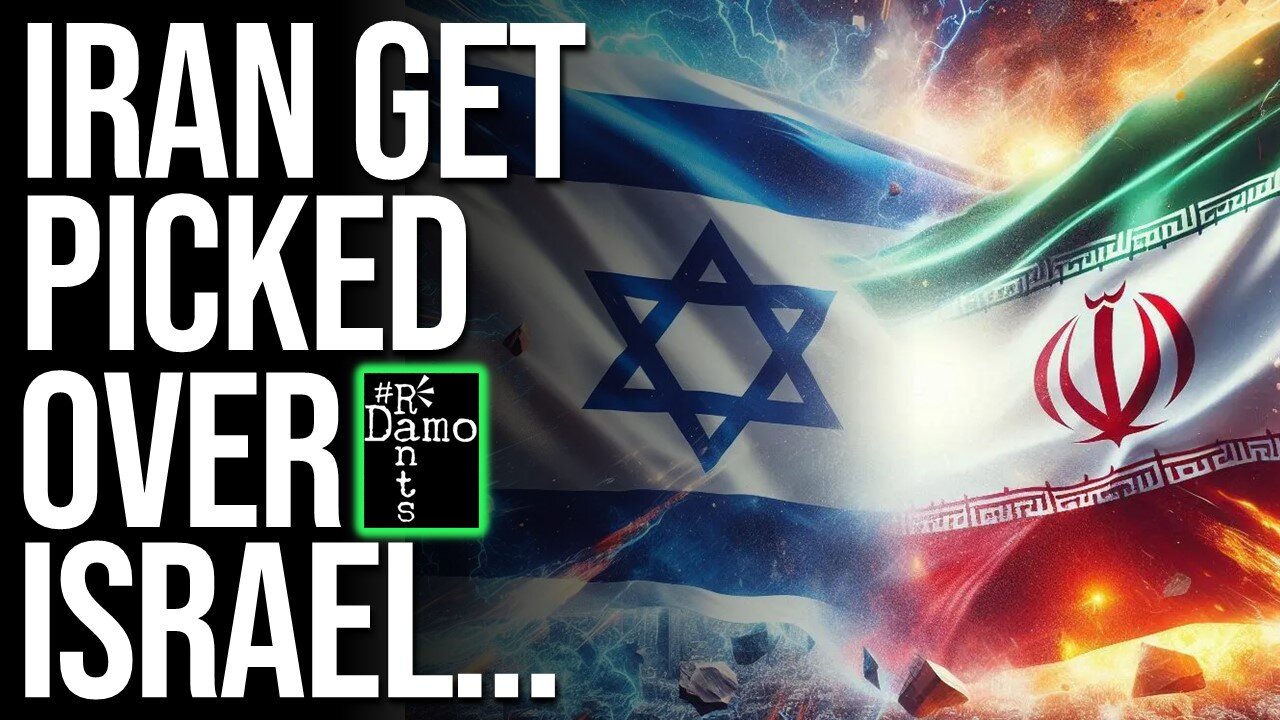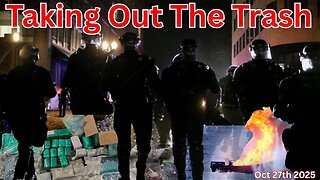Premium Only Content

The Saudi–Iran Pact That Is Shaking Israel’s Confidence
Right, so for decades, the Gulf monarchies have played their roles dutifully—American oil partners, Israeli backchannels, and guardians of a Western-defined “regional order” in the Middle East. But that order is breaking down. Israel's unchecked militarism, America’s waning reliability, and Iran’s rising deterrent power as now ably demonstrated by 12 days of retaliation following an unprovoked Israeli strike have made neutrality not just attractive for those states caught in the middle, but essential. A new script is being drafted—not in Washington or Tel Aviv, not in the interests of the US and Israel, but in Jeddah, in the interests of the likes of Saudi Arabia and Iran. Trump and Netanyahu are going to be hating every last bit of this, the oil rich states seeking closer alignment with a nation they hate, but the key word here is neutral, the Saudis and their ilk are not seeking to take sides, but will they be seen to be doing that anyway by an administration as unhinged as that of Israel?
Right, so this recalibration by Gulf monarchies, as much as Israel might be hating the prospect, is their own doing. It can be traced directly to that most recent bust up between Israel and Iran last month, when Israel carried out an unprovoked airstrike on Iranian nuclear facilities, sparking a rapid Iranian retaliation that culminated in strikes across Israel. The significance of this strike was not merely military—it disrupted trade, paralysed Israel’s port operations, and underscored Iran’s credible regional deterrent.
This escalation had a chilling effect on Gulf capitals. With US bases strewn across their territories, monarchs from Riyadh to Abu Dhabi understood that another round of escalation could pull them into a conflict they had not chosen. Iran’s display of restraint—calibrated retaliation, not maximalist war—convinced Gulf leaders that Tehran was now a force that could not be ignored or dismissed, but that show of restraint also implied this was a force that could be negotiated with, these are mostly businessmen after all.
The Iranian Foreign Minister Abbas Araghchi's visit to the Saudi city of Jeddah was emblematic of this recalibration now that a ceasefire between Israel and Iran is in place. Meeting with Crown Prince Mohammed bin Salman, Foreign Minister Faisal bin Farhan, and Defence Minister Khalid bin Salman, Araghchi's talks were described as "fruitful," with a focus on regional security and economic stability.
This is not the beginning of an alliance. Rather, it marks a strategic hedge. The Gulf monarchies, especially Saudi Arabia and the UAE, are adjusting their policies to reflect the realities of a shifting Middle East. After decades of outsourcing security to the United States and some of these states pursuing normalisation with Israel, though not all, the Saudis for one are still holding out on that, Gulf leaders now recognise the need for a more autonomous foreign policy. They are no longer willing to just be caught between an erratic US administration and an increasingly rogue Israel that the US keeping arming no matter what they do.
This recalibration is not without risk though. The United States still maintains a vast military presence in the Gulf. Riyadh and Abu Dhabi rely on American arms, intelligence, and diplomatic cover. Any overtures to Iran threaten to antagonise Washington, particularly with Trump back in charge.
Israel, too, views Gulf-Iran rapprochement as a betrayal. For Tel Aviv, Iran is an existential threat. Just two weeks after their nuclear sites were struck, Netanyahu us once again saying Iran are just two weeks away from having a nuclear weapon, just as he’s been saying for the last 30 years and Donald Trump is easily stupid enough to fall for the same trick twice. Normalisation with the Gulf—cemented under the Abraham Accords—was intended to isolate Tehran. Saudi-Iranian diplomacy threatens that entirely. And Israeli retaliation of one sort or another may come as a result.
Domestically, Gulf rulers face sectarian contradictions. For decades, Iran has been demonised in Sunni-majority Gulf societies. Shia populations in Bahrain and Saudi Arabia's Eastern Province are viewed with suspicion. Reengaging Iran risks empowering these communities, challenging both political control and ideological narratives.
The Gulf’s recalibration is underpinned by long-term structural shifts that go far beyond these short-term crises though. These developments are transforming the architecture of Middle Eastern power relations and forcing Gulf states to reconsider their traditional alliances.
One of the most critical drivers is the strategic retrenchment of the United States. For decades, the US was the de facto guarantor of Gulf security. Its military bases in Qatar, Bahrain, and Kuwait, along with its naval dominance in the Arabian Gulf, were seen as unshakable. However, recent years have proven otherwise. The US response to the 2019 Aramco attacks, when the Houthis of Yemen, though Iran was accused as well, hit Saudi oil production basically halving it temporarily. Well the US response to that was minimal. Then there was the chaotic withdrawal from Afghanistan, its inability to prevent Israel from dragging the region into war, actively enabling it to do so in fact, and its shifting focus to great power competition in the Indo-Pacific have deeply unsettled Gulf rulers. What was once a dependable patron is now perceived as inconsistent and transactional. This has led to a strategic awakening in Riyadh, Abu Dhabi, and beyond: the United States can no longer be the sole pillar of their security.
Another major shift concerns Israel, once embraced by Gulf leaders as a stabilizing force and a counterbalance to Iran. The Abraham Accords, signed in 2020, symbolised a realignment rooted in shared hostility toward Tehran and a desire for technological and economic collaboration. But Israel’s increasing militarism—particularly its genocide of Gaza and the unprovoked attack against Iran—have made it a liability. Gulf states are now rethinking whether a deeper partnership with Israel serves their long-term interests. The domestic cost is also high: normalisation is widely unpopular among Arab populations, especially after the horrors broadcast from Gaza. For Saudi Arabia, the cost of normalisation now outweighs the benefits, and any momentum toward formal ties have all but evaporated.
In contrast, China is emerging as a more reliable, neutral broker in the region. The 2023 Beijing-brokered rapprochement between Saudi Arabia and Iran was a diplomatic watershed. China’s interest in regional stability is economic, not ideological, which is why they are dealing with Iran to the extent they are, even arming them now, as I spoke about in a video yesterday. China wants safe shipping routes, reliable energy supplies, and peaceful markets for its Belt and Road Initiative. This suits Gulf monarchies well. Beijing does not demand alignment with its foreign policy. It offers investment and infrastructure in exchange for stability. Gulf leaders are increasingly leaning toward a multipolar foreign policy model, balancing US security, Chinese investment, and regional autonomy. Iran’s inclusion in this framework is now more widely seen to be pragmatic: a destabilised Iran threatens Chinese interests just as much as Gulf ones. Their fortunes are now tied.
Economic pragmatism further reinforces this recalibration. Saudi Arabia’s Vision 2030, the UAE’s post-oil diversification plans, and Oman’s economic modernisation all depend on regional stability. Iran’s strategic location at the heart of Eurasia makes it indispensable to regional connectivity initiatives, such as the International North-South Transport Corridor. Gulf monarchies recognise that excluding Iran from economic integration is simply no longer tenable. Trade, tourism, infrastructure, and energy cooperation require a baseline of peace and predictability. With Western-led corridors like IMEC under threat due to Israeli involvement, Iran-backed routes offer an alternative model grounded in regional geography rather than Western strategy which is not seen as nearly as beneficial any longer.
During his Jeddah visit, Araghchi reportedly proposed expanding Gulf-Iranian coordination on maritime security, energy transit, and anti-terrorism cooperation. While these proposals remain aspirational, they represent a shift from US led security frameworks to more regionally owned models.
This is not a Middle East NATO. But it is a step toward a West Asian Helsinki Process—a forum for de-escalation, confidence-building, and ongoing dialogue. Saudi Arabia is positioning itself as a broker, not a battleground. The UAE, too, continues trade with Iran while maintaining ties with Israel, walking a fine line between competing poles.
A regional security architecture inclusive of Iran offers several advantages. It enables Gulf monarchies to proactively manage threats from militias, pirates, and non-state actors. It could reduce arms races, lower military budgets, and open diplomatic pathways to resolve flashpoints. It also allows the Gulf to regain narrative control—presenting itself not as a passive victim of superpower games but as a mature actor capable of shaping its own destiny.
There are issues though, there are some internal contradictions that remain unresolved. How does Riyadh reconcile outreach to Tehran with its war on Yemen? On pause as that technically is, though Saudi backed militias are still active within Yemen. How does Abu Dhabi justify trade with Iran while hosting Israeli intelligence assets? So there is some incoherence still that needs to be resolved if ties are to become more formal.
Further complicating matters is the possibility of US or Israeli sabotage to it all, because who would bet against that? If Iran continues to gain strategic depth, Israel may seek pre-emptive action, they’ll be 30 minutes away from a nuclear weapon or some such Netanyahu notion, Ayatollah Khamenei’s got one under his robes, I’ve seen the bulge or words to that effect. In such a scenario, Gulf leaders would be forced to abandon their fence-sitting and pick a side, potentially undermining years of diplomatic groundwork.
Public opinion is another destabilising variable. If Gulf populations perceive rapprochement with Iran as empowering Shia communities or betraying Palestinian solidarity, domestic unrest could follow. Likewise, appearing too close to Israel in the aftermath of Gaza may provoke backlash among youth populations fed up by injustice and occupation.
So how can this all be resolved then Damo? Well, there’s several plausible scenarios could shape the trajectory of Gulf-Iranian relations and the broader regional order.
One possible scenario is the gradual institutionalisation of a Gulf-Iran security compact. This would involve formal or semi-formal mechanisms for maritime deconfliction, coordinated anti-piracy operations in the Red Sea, and diplomatic consultations on conflicts such as that with Yemen. Under such a model, Gulf states and Iran could stabilise trade routes, lower tensions, and create a framework for crisis management that reduces dependence on external powers. Now you might think, well that sounds a bit ambitious, but this actually already has historical precedent in the regional forums of the Association of Southeast Asian Nations, and also in the post Cold War era when you look at the Organisation for Security and Co-operation in Europe, the OSCE.
A second scenario involves a kind of cold peace. Gulf-Iranian diplomacy continues at a tactical level, where it is now, with incremental progress in trade and coordination but no deep strategic alignment. The Gulf would continue to fence sit essentially—balancing Iran against Israel and the US, while keeping dialogue channels open to all. Such a model offers flexibility but remains vulnerable to shocks: an even more hardline Israeli government, or an aggressive US Middle East policy towards Iran could disrupt this balance. In this framework, Gulf monarchies maintain agency, but at the cost of constant recalibration and policy ambiguity.
The third and most dangerous scenario is a breakdown of the rapprochement due to provocation or political change, or pressure applied to the Gulf States. This could be triggered by another and far worse Israeli-Iranian exchange, exactly what Benjamin Netanyahu is after currently in the US. A false flag operation, a Gulf-targeted Houthi attack misattributed to Tehran, we know the kind of things they could do don’t we? A rollback of the Jeddah process could polarise the region once again, forcing Gulf monarchies to recommit to the US-Israel axis and reigniting confrontations across the region. This scenario would not only derail economic visions like Saudi Vision 2030 and the UAE’s diversification plans but would also destabilise global energy markets and maritime trade, it fundamentally doesn’t suit anyone except Benjamin Netanyahu.
What unites all these possible outcomes, crystal ball gazing as you could accuse me of I suppose, but they make sense to me, is the central role of agency. The Gulf is no longer being acted upon—it is acting. The future will be shaped not only by the provocations of others, but by the decisions made in Riyadh, Abu Dhabi, Doha, and Muscat. Whether these decisions lead to peace, paralysis, or peril will depend on the Gulf's capacity to align national interests with regional stability, and to defend its diplomatic gains against the pushback of past alliances.
The Gulf's shift toward rapprochement with Iran poses a strategic nightmare for Israel. For decades, Israel's regional strategy has been predicated on isolating Iran, forging covert or overt alliances with Arab states, and positioning itself as a bulwark of Western security interests. The Abraham Accords were not merely diplomatic trophies—they were foundational to Israel’s regional containment strategy against Tehran. Now, with Saudi Arabia, the most influential Arab state, openly engaging with Iran, the very foundation of Israel’s strategy is under threat.
First, the erosion of anti-Iran sentiment dilutes Israel’s ability to bring Gulf States to their viewpoint painting Iran as that existential threat. If Gulf states increasingly treat Iran as a partner rather than a pariah, it weakens Israel’s justification for aggressive military policies, including pre-emptive strikes and targeted assassinations, as we’ve seen already during that 12 day conflict. This undermines Israel's diplomatic leverage with both Washington and Europe, which often rely on Arab silence or complicity to justify their own alignment with Israeli security doctrines.
Second, the collapse or stagnation of normalisation talks—especially with Saudi Arabia—represents a major political setback for the Netanyahu government. Normalisation was to be the diplomatic capstone of his foreign policy legacy, offering regional legitimacy in exchange for technological and security collaboration. Instead, the optics of Arab leaders embracing Iranian diplomats, while Israeli bombs fall on Gaza and Haifa comes under Iranian fire, signal a diplomatic reversal of some significance.
Third, Israel now faces a more diplomatically empowered and less isolated Iran. If Iran can count on Arab neutrality—or worse, active diplomatic engagement—during times of conflict, as Netanyahu is clearly attempting to paint the current situation despite the current ceasefire, Israel will be forced to reconsider the costs of confrontation. It may lose its ability to act with impunity, knowing that its aggression could now alienate not only Tehran, but its own supposed Arab allies.
Finally, the shift threatens Israel’s economic ambitions. With Red Sea security under question, and Gulf connectivity projects pivoting eastward toward Iran-linked corridors, Israel risks being sidelined in regional trade routes. The economic fallout of that could further compound the strategic isolation Tel Aviv now faces as a result of its strikes on Iran.
In short, the Gulf-Iran rapprochement flips the Israeli security doctrine on its head. Israel finds itself increasingly alone – the very thing it wanted for Iran - unable to compel regional consensus, and facing a Middle East where former allies are now carving their own paths—ones that do not require Tel Aviv’s blessing.
The Gulf monarchies are no longer content to be clients of Washington or silent partners of Tel Aviv. The Araghchi-MBS meeting in Jeddah symbolised a new doctrine: sovereign diplomacy rooted in regional realities. This is not an ideological pivot, things are nowhere near that far along, but it is a pragmatic recalibration by Gulf States towards Iran in mutual interests.
If successful, this strategy could transform the Gulf from a zone of proxy wars and foreign bases into a hub of peaceful cooperation. If it fails, the consequences will be dire: more war, economic collapse, and political upheaval.
But for now, the Gulf monarchies are choosing agency over obedience. Their challenge is to prove that a balanced, region-first diplomacy is not only desirable, but durable in the face of a volatile and often vindictive geopolitical landscape, still dominated by the US and its proxy in Tel Aviv.
For more on how Iranian ties with China are giving Israel a still larger economic headache and which leads in nicely to China’s growing Gulf influences too, check out this video recommendation here as your suggested next watch.
Please do also hit like, share and subscribe if you haven’t done so already so as to ensure you don’t miss out on all new daily content as well as spreading the word and helping to support the channel at the same time which is very much appreciated, holding power to account for ordinary working class people and I will hopefully catch you on the next vid. Cheers folks.
-
 LIVE
LIVE
Wendy Bell Radio
5 hours agoTaking Out The Trash
7,887 watching -
 10:45
10:45
NewsTreason
12 hours agoHealth Spotlight: Krill Oil vs Fish Oil with Dr. Chad Walding, Co-founder, NativePath
5.48K6 -
 7:07
7:07
SpartakusLIVE
1 hour agoHacker BANNED LIVE in streamer match
1 -
 1:07:00
1:07:00
Chad Prather
22 hours agoFinding Peace, Purpose, and Power in a Hostile Age
59.2K25 -
 LIVE
LIVE
LFA TV
14 hours agoLIVE & BREAKING NEWS! | MONDAY 10/27/25
2,658 watching -
 1:24:46
1:24:46
Game On!
17 hours ago $4.18 earned2025 Sports Equinox Betting Preview!
20K2 -
 32:51
32:51
The Why Files
3 days agoCIA Time Travel Secret | The Grays Are Future Humans
32.1K44 -
 30:13
30:13
Athlete & Artist Show
22 hours ago $6.47 earnedNew Single Game Shots Record!
33.6K5 -
 13:29
13:29
Demons Row
14 hours ago $3.11 earnedThings I Wish I Knew Before Joining a 1% Outlaw Motorcycle Club
17.8K10 -
 22:24
22:24
Jasmin Laine
19 hours agoTrump SLAMS Canada As “Land of PROPAGANDA and Economic COLLAPSE!”
20.8K49